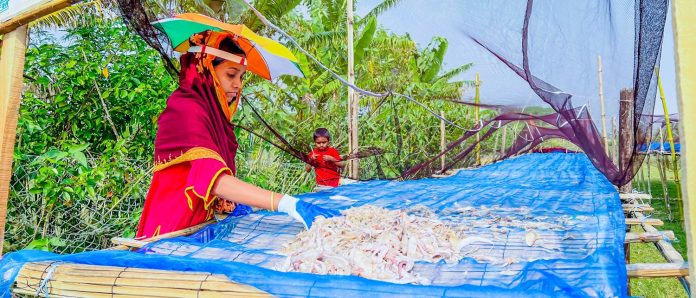Char Kukri Mukri Union of Char Fashion Upazila in Bhola District, located in the south of Bangladesh, is completely isolated from the mainland and surrounded by rivers and the Bay of Bengal. River erosion, floods, tidal waves, and cyclones constantly challenge the lives of the people in this union.
Bilkis Begum (36), one of many PPEPP-EU members, lives with her family in a small thatched house on the bank of the Meghna River in Char Patila village of Char Kukri Mukri Union. Like others, Bilkis Begum’s family, comprising her husband, two sons, and two daughters, continues to struggle against natural hazards. In these adverse climatic conditions, they live on her husband’s modest income, who works as a day labourer or often as a contracted fisherman on other people’s boats. Feeding the large, six-membered family has long been a challenge for Bilkis and her children’s education had to be halted too.
Fortunately, things changed for her after joining the PPEPP-EU project. Bilkis now produces dried fish (locally known as Shutki), a sustainable income-generating activity (IGA) supported by PPEPP-EU.
Bilkis attended a two-day training on hygienic dry fish production and marketing from PPEPP-EU. Then, she received a grant to buy the necessary inputs for dry fish processing, such as fish, mosquito nets, filter nets, PVC nets, salt, turmeric powder and buckets. During her journey to establishing her dry fish farm, she received one-to-one technical advice and guidance from the project’s livelihood staff. Moreover, she is not alone as her sons, daughters, and husband also assist her in processing the dry fish.
In her first year, during the season, she earned about BDT 60,000 over three months by selling hygienically prepared dried fish. Previously, her dried fish, produced with local methods, sold for only BDT 120-130 per kilogram. However, by applying the knowledge gained from the training, she added value to her dried fish products selling at BDT 250 to 260 per kilogram, nearly doubling the price.
The following year, in 2023, she took a loan of BDT 50,000 from the ‘Paribar Unnayan Sangstha (FDA)’, a partner organisation of PPEPP-EU and earned about BDT 80,000 by selling dried fish in that season. Continuing her progress into 2024, she earned BDT 120,000 from dried fish sales during that season.
With her earnings, Bilkis is paying off her debts, supporting her family, and continuing her children’s education. Her eldest son is in 6th grade, her middle son in 4th grade, and one daughter in 1st grade. She no longer lives in a Golpata (a type of coastal leaf) house and has made a tin-shade house to live with her family.
Her social acceptance has also improved as her financial situation has strengthened. She now participates in various community events, like others in her area. Her husband consults her on family matters and they make joint decisions.
Inspired by Bilkis Begum’s success, many others in her area have engaged in producing safe dried fish. The Meghna bank of Char Patila is now known as the safe dried fish village. Due to the PPEPP-EU project’s linkage with the wholesalers, the producers of safe dried fish of Char Patila can sell their dried fish at fair prices without difficulty. In addition, during winter, many tourists visit and purchase dried fish from the Char Patila village.
‘Dry fish production has benefitted not only me but also many others in our area who were inspired by my success. We dream of exporting our dried fish to foreign countries someday,’ says Bilkis, who lives happily with her family thanks to her additional income from her dried fish enterprise.


